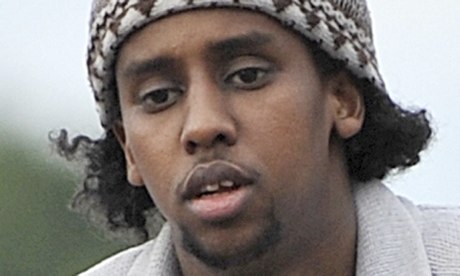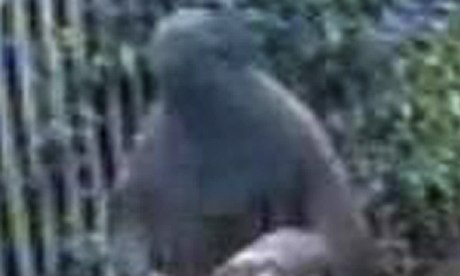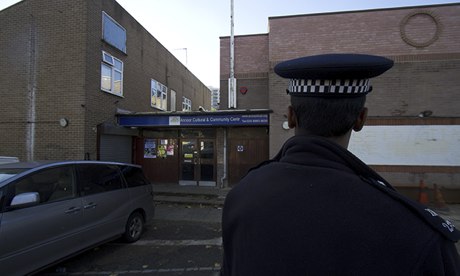
Wednesday, November 13, 2013
by: Ian Cobain

Mohammed Ahmed Mohamed: snatched in Somalia by a team led by a man with a British accent, according to a fellow detainee. Photograph: Metropolitan Police/PA
The hunt was on from the moment that terrorism suspect Mohammed Ahmed Mohamed sliced off the electronic tag that was strapped around his ankle, donned a burqa and slipped away from a London mosque.
Within hours, the Home Office was announcing that a joint taskforce of police, Border Agency officials and MI5 officers had been ordered to track him down. According to some reports, undercover soldiers were also drafted in. One newspaper declared that Mohamed had "made a mockery" of the government's claim to protect the public, while another offered a reward for information leading to his capture: "£25k to Find the Burka Bunker".
Behind the headlines about the manhunt, however, lies another story. It is one that is a little less dramatic. But in the eyes of some, it is a story that is far more disturbing.
Mohamed was in Britain against his will: he had been forced aboard an aircraft in Somaliland, the breakaway territory in northern Somalia, and flown to the UK in March 2011 in an operation that his lawyers say amounted to little more than an act of rendition. He and a second man had been detained in Somaliland two months earlier and allegedly suffered severe mistreatment while they were being interrogated. Since then, evidence has emerged that the British government had a hand in their detention, and may have supplied many of the questions.
As a consequence, the coalition government is now facing, for the first time, serious allegations of complicity in rendition and torture. The men's accusations, if true, would appear to flatly contradict the assurancesgiven by the heads of the three main intelligence agencies when they stepped out of the shadows for the first time last week, telling the intelligence and security committee they have learned a great deal since 9/11, and that "at this stage" their officers could not possibly become complicit in torture. However, the public may never learn whether the allegations are true or not: when Mohamed and the second man decided to sue the British government for damages, lawyers representing the intelligence agencies called upon the secret justice provisions of the highly controversial Justice and Security Act.
It is the first time that the government has resorted to these provisions since the act became law earlier this year. As a consequence of this move, any evidence that the government itself possesses that supports the allegations is unlikely ever to see the light of day. Instead, any such evidence will be heard by the court in secret, and part of the court's final judgment will also remain concealed.
Mohamed, 27, and the second man, a 25-year-old, are both British citizens of Somali descent. MI5 is satisfied that both are terrorists who are deeply involved with al-Shabaab, the group that carried out the attack on Nairobi's Westgate shopping mall in September.
While the two men deny this allegation, Mohamed is assessed to be linked to a group said to have received terrorism training from Saleh Nabhan, a leading al-Qaida figure suspected of involvement in the 1998 US embassy bombings in east Africa. He is also said to have received terrorism training and to have fought for al-Shabaab, and is accused of helping other British men slip into and out of Somalia, where his wife and two children live.
The second man can be identified only as CF since becoming subject to a Terrorism Prevention and Investigation Measure (TPIM) notice, introduced to replace control orders. He travelled to Somalia in 2009, where he too is said to have received training and fought alongside al-Shabaab.
When Mohamed went on the run, Theresa May, the home secretary, said he did not pose "a direct threat" to the public. Nevertheless, MI5's anxieties about young British Muslims travelling to Somalia were made public in a speech given by the agency's then director general, Jonathan Evans, in September 2010. "I am concerned," he said, "that it is only a matter of time before we see terrorism on our streets inspired by those who are today fighting alongside al-Shabaab."
It appears that, in January 2011, CF wished to return to the UK via Addis Ababa, and asked Mohamed to help him travel across Somaliland and on to the Ethiopian border. On the night of 14 January, while staying in a house in the town of Burao, the pair heard a helicopter hovering overhead. Moments later, a group of armed and uniformed men burst through the front door, forced hoods over their heads and tied their hands tight behind their backs. CF claims he could hear the leader giving orders in English, with a British accent. At one point, the hoods were said to have been lifted briefly so that their faces could be checked against what appeared to be mugshots. Both men say they were fingerprinted and that DNA swabs were taken from inside their cheeks; CF says "Bravo 1" was written across his forehead.
Over the next few days, the two men allege, they faced mock executions and severe beatings, and were then held in brightly lit cells at a prison in Somaliland. CF claims he was kept naked for a period, and was once half-strangled with a piece of cloth. When a UK Foreign Office consular official visited CF a month after his detention, he recorded that marks, apparently from handcuffs, were visible on CF's wrists.
Both men also say they were interrogated repeatedly, and that they believe the questions were based on information that can only have been supplied by the British authorities. Meanwhile, the local media reported that their capture was the result of a joint operation by British and Somaliland intelligence officers.
On 13 March, the two men were taken from the prison to an airport, where they were forced aboard a flight to Dubai. Mohamed says he begged to be returned instead to Somalia, to be reunited with his family. In Dubai, they were put aboard another flight, to London, and guarded en route. Neither man was aware of any formal deportation process. The British government says the deportation was lawful under Somaliland law; the men's lawyers complain that they had, in effect, been rendered.

A CCTV image of Mohamed making his escape dressed in a burqa. Photograph: AFP
Since their forced return to the UK, evidence that the government was closely involved in the detention operation in Somaliland has seeped steadily into the public domain. First it became apparent that May had signed Mohamed's control order on 13 January 2011, the day before the pair were arrested. Then it became clear that in March that year, two days before the pair were taken from prison and forced aboard an aircraft, MI5 had sent an email to police at Heathrow giving precise details of the flight upon which the men would be arriving at the airport. The agency said it wanted Mohamed to be held and questioned underSchedule 7 of the Terrorism Act 2000 – the same measure that was usedto detain David Miranda, the partner of former Guardian journalist Glenn Greenwald. MI5 had 118 questions it wanted to be put to Mohamed.
The email asked police to make a full record of any complaints he made about his treatment in Somaliland, but warned officers: "We would be grateful if you would NOT be drawn into any discussion with MOHAMED regarding HMG [Her Majesty's Government] involvement in his arrest." The email also showed that the agency was anticipating the possibility of being sued for damages over the affair: "You should be aware that any such write up is likely to be disclosable in any future civil proceedings."
After five hours of questioning at Heathrow, Mohamed was told he had been made the subject of a control order, and was compelled to go and live in the east of England – in a town where he knew nobody and where MI5 believed he would be far removed from his jihadist associates.
Later that year, the high court ruled that the police at Heathrow had abused their powers when they detained Mohamed. Schedule 7 permitted them to detain and question him only in order to help establish whether or not he was a terrorist: but the home secretary had determined that he was a terrorist two months earlier, when she signed his control order.
The purpose of holding Mohamed at the airport, despite the police not having the lawful power to do so, appears to have been in order to ask MI5's 118 questions. Mohamed says these were essentially the same questions that had already been put to him while he was being beaten and threatened with death in a jail in Somaliland.
His solicitor, Gareth Peirce, is highly critical of what she says was an attempt to clean up information that had previously been extracted under torture: "Schedule 7 was unlawfully deployed, and extended far beyond any legitimate legislative purpose to launder 'intelligence' obtained, equally unlawfully, from torture in Somaliland." While ruling that there had been improper use of Schedule 7 powers, the judge commented: "It was clear that the Security Service, for entirely understandable reasons, was anxious if possible to get information which could not be regarded as tainted by torture allegations or which might confirm the propriety of a control order."
In July last year, at the high court, while Mohamed was challenging his control order, the court heard that, a few weeks before the two men had been detained and forcibly removed to the UK, the Crown Prosecution Service had advised Scotland Yard there was insufficient admissible evidence to charge Mohamed with any terrorist offence.
An MI5 officer gave evidence at that hearing, and Mohamed's counsel, Tim Otty QC, asked him a series of questions. Had the agency been involved in Mohamed's detention in Somaliland? Did it accept that such an operation had no basis in law? Would MI5 acknowledge that it had "participated actively" in Mohamed's interrogation despite knowing he had suffered serious physical mistreatment? Had the agency beeninvolved in his removal from Somaliland to the UK? Was it aware that CF had been beaten and subjected to a mock execution after his arrest?
To each of these questions, the MI5 witness gave the same reply: "I can neither confirm nor deny that."

An Noor Masjid and Community Centre in Acton, London, from where Mohamed slipped away in a burqa. Photograph: Amer Ghazzal/Demotix/Corbis
Before the 2010 general election, a number of politicians who are now cabinet ministers quietly let it be known that they were horrified at the way in which the country's intelligence agencies had become involved in rendition and the mistreatment of terrorism suspects after 9/11, and that they were greatly concerned there appeared to have been ministerial approval. Within two months of the formation of the coalition, David Cameron signalled a change of direction when he announced that there would be an inquiry, and that the hitherto-secret policy that governed MI5 and MI6 "detainee operations" would be rewritten and made public.
Some sounded a note of caution. Sir John Sawer, the head of MI6, for example, pointed out in an unprecedented public speech that the agencies could not afford the luxury of working only with friendly democracies. "Dangerous threats usually come from dangerous people in dangerous places," he said. "We have to deal with the world as it is." But across much of Whitehall the sense of relief was almost palpable.
Three years on and the inquiry has been shelved amid a behind-the-scenes dispute about control of the evidence that was to be made public. An interim report from the inquiry has been sitting on the prime minister's desk for almost 18 months, despite a government pledge that as much as possible would be published. Four separate police investigationsgrind slowly on.
The intelligence agencies – and government ministers – are once again facing what Otty described in the high court last week as "core allegations of very grave misconduct". The Foreign Office and Home Office both told the Guardian that they were unable to comment on the allegations that the government now faces, precisely because of the ongoing proceedings in the civil courts. Government lawyers are indicating that they may attempt to have Mohamed's case struck out, on the grounds that it would be wrong for the courts to entertain such a claim while he is in breach of an order of the court by being on the run.
Almost two weeks after Mohamed disappeared, there remains no sign of him.
That still leaves CF's damages claim against the government. However, CF's solicitor, Ravi Naik, fears that the use of the secret justice measures of the Justice and Security Act will result in an odour of suspicion for ever lingering around the affair. "Our client could fail or succeed in his case without ever knowing why," Naik says. "This much is clear from the fact that the government has sought to put its entire defence into secret sessions.
"In those circumstances, our client – and the public – will for ever be kept in the dark about whether the British government was involved in serious wrongdoing."